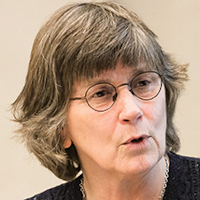Coby van der Linde
 Coby van der Linde has been Director of the Clingendael International Energy Program since 2001. This independent forum contributes to the public debate about international, political and economic developments in the energy sector. Prior to this Van der Linde was member of the Energy Council and Professor of Geopolitics and Energy Management at the University of Groningen.
Coby van der Linde has been Director of the Clingendael International Energy Program since 2001. This independent forum contributes to the public debate about international, political and economic developments in the energy sector. Prior to this Van der Linde was member of the Energy Council and Professor of Geopolitics and Energy Management at the University of Groningen.
‘Notwithstanding the good intentions of the 2015 Paris climate summit, the global use of fossil fuels is for the time being still considerably increasing, and with it the CO2 emissions as well. The use of gas, oil and coal is increasing in Asia in particular. The expectation is that fossil fuels will also continue to be the dominant fuels of the other non-OECD countries over the coming years.
Yet, increasingly more governments are expected to switch to renewable energy sources over the long term (wind, hydro power, solar). The insight that is increasingly accepted globally, is that this is not only better for the climate, it also helps countries to manage import dependency and thus the effects of the continually changing geopolitical situation. In addition, economic value increases as a driving force. Smart projects make it possible to save costs and investments pay for themselves increasingly faster.
In Europe, plenty of initiatives for producing more sustainable energy are emerging. The Netherlands is forging ahead with the construction of offshore wind parks in the North Sea. In ten years’ time sustainable hydrogen technology might also be ready for large-scale introduction into the Dutch energy and raw materials system. In the Rotterdam region, the Rotterdam Heating Company is supplying the residual heat generated by the Port of Rotterdam to Rotterdam’s district heating networks. As a result, these buyers use less fossil fuels. This reduces greenhouse emissions and also saves energy. Things therefore appear to be moving in the right direction.
To succeed in achieving the global energy transition, the business community and investors naturally play a crucial role. A transition like this requires experimenting, innovating and risk taking. New infrastructure will need to be constructed and new products to be developed. During the management days of the Van Leeuwen Pipe and Tube Group in November 2017, I spoke with Van Leeuwen’s top management about the energy transition and what this means for the company. As a supplier of pipes and pipe systems for the industry, Van Leeuwen will be making a large contribution to the energy transition. For example, by working on smart solutions with customers and suppliers. The technology is the motor behind this development. Naturally this is also exciting, because no one knows exactly how the energy world is going to change over the coming ten years. However, doing nothing is not an option. Exploring your business opportunities is the key.’
